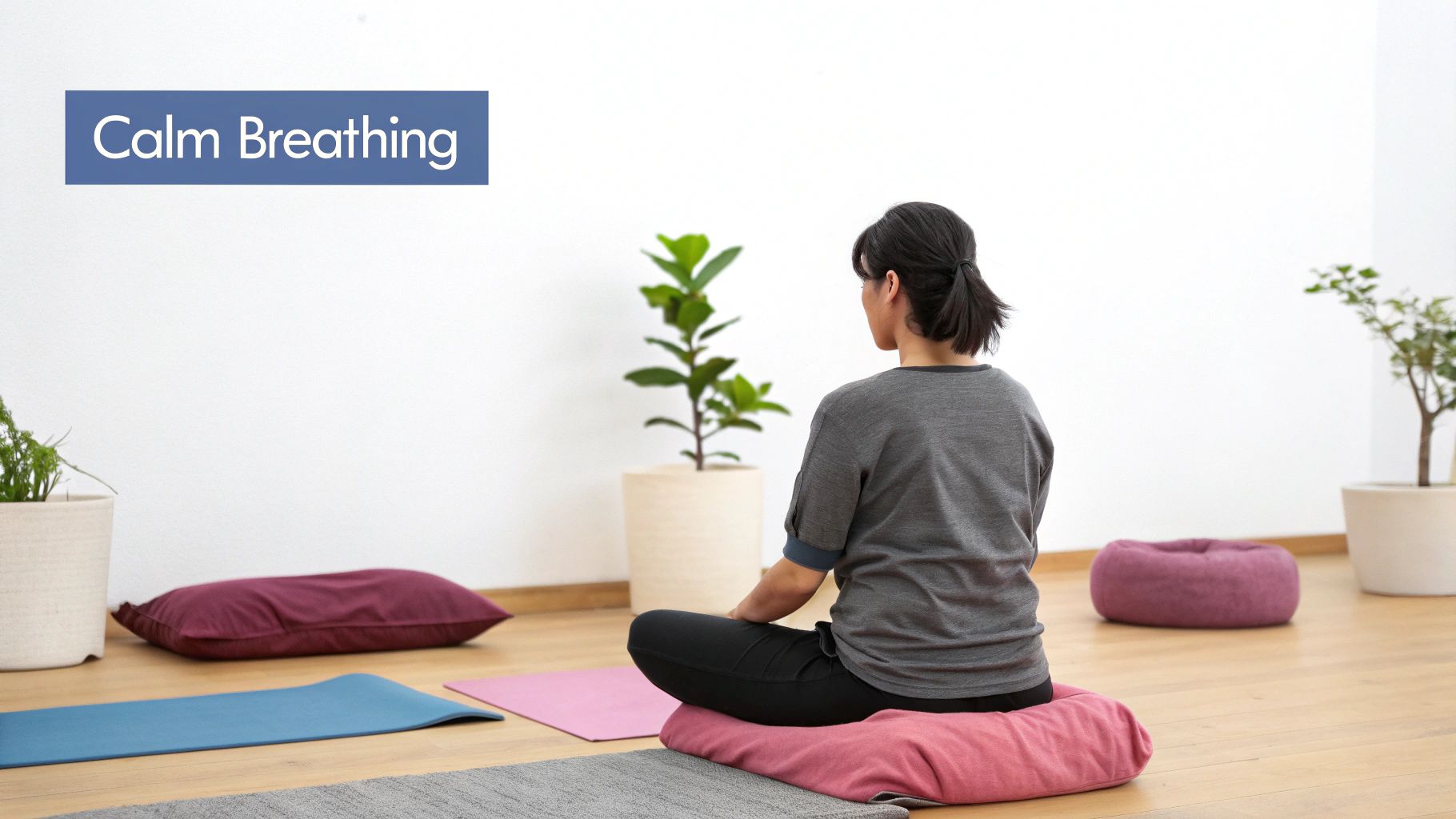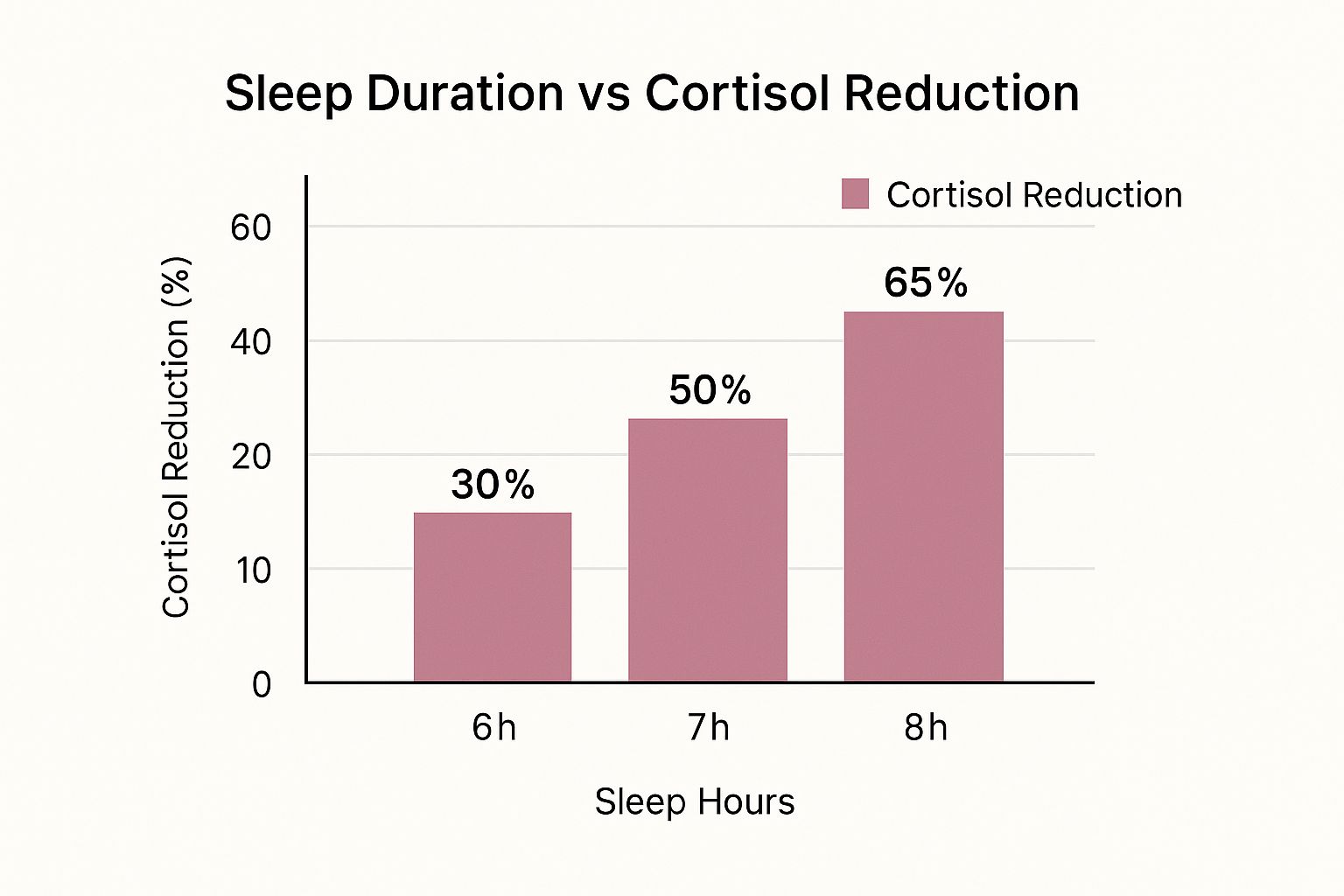If you're looking to naturally lower your cortisol levels, the first step is to really grasp what it is: your body's number one stress hormone. It's brilliant in short bursts for those 'fight or flight' moments, but when stress becomes constant, those high levels can wreak havoc on your health. Think fatigue, stubborn weight gain, and restless nights.
Understanding Your Body's Stress Response

Picture cortisol as your body’s own personal alarm system. When you’re up against a perceived threat – whether it’s a tight work deadline or getting cut off in traffic – your adrenal glands pump out cortisol. This is a completely normal and very handy response, giving you a quick shot of energy and focus to tackle whatever's in front of you.
The real trouble starts when that alarm system gets stuck in the 'on' position. In our non-stop, modern world, many of us are marinating in a state of low-grade stress. The endless ping of phone notifications, money worries, and a to-do list that never shrinks can keep that cortisol tap running. This is what we mean by chronically high cortisol.
The Real-World Impact of High Cortisol
When cortisol is constantly high, it's not just a number on a lab test; it has a very real impact on how you feel day in and day out. This isn't about extreme medical issues like Cushing's syndrome, but the slow, creeping effect of everyday stressors piling up.
You might even recognise some of its tell-tale signs:
- Persistent Fatigue: That classic "wired but tired" feeling. You could get a full eight hours of sleep and still wake up feeling completely drained.
- Stubborn Weight Gain: Especially that frustrating fat that clings to your middle. High cortisol can crank up cravings for sugary, fatty comfort foods and tell your body to store it all as belly fat.
- Poor Sleep: Tossing and turning, struggling to drift off, or waking up in the middle of the night. Cortisol messes with your body's natural sleep-wake rhythm.
- Weakened Immunity: Do you seem to catch every single cold or bug doing the rounds? That’s because, over time, high cortisol can suppress your immune system.
It’s a vicious cycle, isn't it? The exhaustion from poor sleep makes it tougher to handle stress, which just keeps your cortisol levels sky-high. It creates a feedback loop that feels impossible to escape without taking conscious action.
Cortisol isn’t the villain here; it’s just a messenger. The real challenge is learning to manage the messages we’re sending it through our daily habits and environment.
How Cortisol Changes Over a Lifetime
What’s really interesting is that our cortisol production doesn't stay the same throughout our lives – it actually follows a predictable pattern. And this isn't just a theory; it's backed by solid research. For example, large studies of UK adults have shown that cortisol levels often follow a U-shaped curve over a lifetime. They tend to be higher in early adulthood, take a dip in our 30s and 40s, and then start to climb again from around age 60 onwards. You can dive deeper into these findings on natural cortisol changes from this UK cohort study.
Making this connection between how you feel every day and the science of cortisol is your first real step toward finding your balance again. Once you recognise how modern life fuels this stress response, you can start putting targeted, practical strategies in place to lower your cortisol and finally feel more like yourself.
Eating to Calm Your Cortisol Levels
What you put on your plate is one of the most powerful and direct ways to manage your body’s stress response. I'm not talking about a punishing, restrictive diet or banning your favourite foods forever. It’s about making smart, consistent choices that naturally lower cortisol and help bring your hormones back into a healthier rhythm.
Let's get past the vague advice to just “eat healthy” and dig into the specifics. Certain foods can actively work to calm your system by keeping your blood sugar stable, tamping down inflammation, and giving your body the raw materials it needs to handle stress properly.
The Problem with Unstable Blood Sugar
Picture your blood sugar and cortisol levels on a seesaw. When one shoots up, it often yanks the other one with it. A sugary pastry or a big bowl of white pasta causes a rapid spike in your blood sugar, and your body scrambles to release insulin to deal with the rush.
But what goes up, must come down. That inevitable blood sugar crash signals an emergency, prompting your adrenal glands to pump out cortisol to stabilise things again. This creates a rollercoaster of energy spikes and crashes, keeping your stress hormones on constant high alert. It’s exactly why skipping meals, especially breakfast, can be so damaging—it literally starts your day in a state of physiological stress.
Fuel Your Body with Complex Carbohydrates
The secret to breaking this cycle is swapping simple, fast-releasing carbs for complex, slow-releasing ones. These give you a steady stream of energy, minus the dramatic peaks and troughs.
Your new best friends for sustained energy include:
- Oats: A bowl of porridge is a classic for a reason. It digests slowly, keeping you full and your blood sugar balanced for hours.
- Sweet Potatoes: A fantastic source of fibre and nutrients. They're perfect roasted as a side or as the base of a meal.
- Quinoa and Brown Rice: These grains provide a much slower, more gentle release of glucose compared to their white, refined cousins.
- Legumes: Think lentils, chickpeas, and black beans. They’re packed with both fibre and protein—a winning combo for hormonal balance.
When you build your meals around these kinds of carbs, you give your body the stable fuel it craves, reducing the need for cortisol to constantly jump in and manage energy crises.
The Anti-Inflammatory Power of Omega-3s
Chronic stress isn’t just in your head. It creates a state of low-grade inflammation throughout your body, which is a stressor in itself and can push cortisol even higher. Omega-3 fatty acids are potent anti-inflammatory agents that can help to counteract this.
The food you eat can either fuel the fire of stress-induced inflammation or help to put it out. Choosing anti-inflammatory foods is a proactive strategy for calming your entire system.
You’ll find these essential fats in:
- Oily Fish: Salmon, mackerel, and sardines from UK waters are excellent choices. Aim for at least two servings a week.
- Nuts and Seeds: Walnuts, flaxseeds, and chia seeds are plant-based powerhouses of omega-3s. A small handful of walnuts or a tablespoon of ground flaxseed in your porridge can make a real difference.
Embrace Magnesium, the Calming Mineral
Magnesium is a bit of an unsung hero. It’s involved in over 300 biochemical reactions in the body, including regulating the entire stress response. It helps calm the nervous system and is vital for producing the 'feel-good' neurotransmitter, serotonin. The catch? Stress itself burns through our magnesium stores, making it even more important to top them up through your diet.
Great UK-available sources of magnesium include dark leafy greens like spinach and kale, almonds, avocados, and even dark chocolate (look for at least 70% cocoa). Making these a regular feature in your diet is a simple way to support your body's ability to relax and naturally lower cortisol.
To help you get started, here's a quick reference table of foods that can help bring your cortisol back into balance.
Cortisol-Balancing Foods and Their Benefits
| Nutrient/Food Group | UK-Sourced Examples | Mechanism of Action |
|---|---|---|
| Complex Carbohydrates | Scottish Oats, Jersey Royal Potatoes, UK-grown Quinoa | Provides slow-release energy, preventing blood sugar crashes that trigger cortisol release. |
| Omega-3 Fatty Acids | Scottish Salmon, Cornish Mackerel, Flaxseed, Walnuts | Reduces systemic inflammation, a key driver of elevated cortisol. |
| Magnesium-Rich Foods | Spinach, Kale, Almonds, Dark Chocolate (70%+) | Calms the nervous system and supports the regulation of the body's stress-response axis. |
| Vitamin C | Berries (Strawberries, Raspberries), Bell Peppers, Broccoli | Helps lower cortisol post-stress and supports adrenal gland function. |
| Fermented Foods | Live Yoghurt, Kefir, Sauerkraut | Supports a healthy gut microbiome, which communicates with the brain to regulate mood and stress. |
Incorporating these foods isn't about perfection, but consistency. Small, regular additions can make a huge impact over time.
This chart shows how sleep—another key factor deeply influenced by diet—directly impacts cortisol.

As you can see, while any extra sleep helps, the jump from seven to eight hours provides a really significant boost in cortisol reduction.
Foods to Limit for Better Hormonal Balance
Just as important as what you add to your diet is what you decide to limit. Some foods and drinks are notorious for sending cortisol levels through the roof.
The main culprits? Excessive sugar, refined carbohydrates, and too much caffeine. That morning coffee might feel non-negotiable, but relying on multiple cups to get through the day can seriously backfire, leaving you in that "wired but tired" state. Try swapping that second or third coffee for a herbal tea like chamomile or peppermint. It’s a simple change that can give your adrenal glands a much-needed break.
By focusing on whole, nutrient-dense foods and being mindful of these key triggers, you can create a diet that actively supports your journey to lower cortisol.
Lifestyle Changes for Lasting Stress Reduction

While your diet lays a fantastic foundation, it’s your daily habits that truly build resilience against chronic stress. This is where you’ll see some of the most profound and lasting results. These lifestyle shifts are powerful signals to your body, telling it that it’s safe to power down from high-alert mode and let cortisol levels fall naturally.
Let's start with sleep. It's the non-negotiable cornerstone of hormonal balance. When you don't get enough quality rest, your body flags it as a major stressor, cranking out more cortisol the next day. This is what leads to that awful "wired but tired" feeling, where you're too exhausted to function but too buzzed to switch off.
Crafting Your Sleep Sanctuary
Getting better sleep isn't just about heading to bed earlier. It’s about creating an environment and routine that genuinely encourages deep, restorative rest. The goal is to turn your bedroom into a true sanctuary, dedicated only to sleep and intimacy. That means laptops, televisions, and any stressful clutter have to go.
A consistent pre-sleep routine is your best tool for signalling to your brain that it's time to wind down.
- Dim the Lights: About an hour before bed, lower the lights around your home. This simple act helps kickstart the production of melatonin, your body’s natural sleep hormone.
- Disconnect from Screens: The blue light from our phones and tablets is a known melatonin suppressor. Put all devices away at least 60 minutes before you plan to sleep.
- Try a Warm Bath: A warm bath with Epsom salts (an excellent source of calming magnesium) can relax your muscles and soothe your nervous system, making it much easier to drift off.
Move Your Body Mindfully
Exercise is a brilliant tool for managing stress, but the type of exercise you choose is crucial, especially when cortisol is already high. It's a common mistake to think you need to thrash yourself with intense workouts. Sometimes, long, gruelling sessions can just act as another stressor, paradoxically pushing cortisol even higher.
Instead of forcing yourself through a tough HIIT class every day, focus on activities that soothe your system.
- Gentle Walks: A simple 20-30 minute walk, especially in the morning sun, can help reset your natural cortisol rhythm for the day ahead.
- Yoga and Tai Chi: These ancient practices are incredible because they combine mindful movement with deep breathing, directly activating your parasympathetic nervous system—your body's "rest and digest" state.
- Restorative Stretching: Just a few minutes of gentle stretching before bed can work wonders to release the physical tension you've been holding onto all day.
So many people try to 'burn off' stress with high-intensity exercise. But when your body is already chronically stressed, gentle, restorative movement is often far more effective at calming your nervous system and helping you recover.
The Power of Nature and Real Connection
Never underestimate what spending time in nature can do for your physiology. Research shows that even 20 minutes in a park or a garden can significantly lower cortisol levels. This effect, sometimes called "forest bathing," is a potent antidote to our modern, screen-filled lives. The sights, sounds, and smells of the natural world have a scientifically proven calming effect on our bodies and minds.
Just as vital is genuine social connection. In a world where we're constantly online, it’s surprisingly easy to feel isolated. Making time for real, face-to-face chats with friends and loved ones is critical for your emotional wellbeing. Laughter, in particular, is a powerful stress buster. It boosts endorphins, lifts your mood, and can physically soothe tension, helping to lower cortisol right in the moment.
Think about the last time you had a proper belly laugh with a friend. That feeling of release and connection? That's your body's chemistry shifting for the better. If you're looking for more practical tips, our guide to natural stress relief has plenty of other strategies you can try.
Building Lasting Habits
The key to making these lifestyle changes stick is consistency, not perfection. You have to start small. Maybe this week, your only goal is to create a 15-minute "wind-down" routine before sleep. Next week, you could add in a couple of 20-minute walks.
By making these small, sustainable adjustments, you build new habits that work together to lower cortisol naturally. You're not just fighting stress; you're paving the way for lasting calm and resilience.
Mindfulness Practices That Actually Work
Your mind and your hormones are in constant conversation. When you're mentally juggling worries, deadlines, and a constant stream of "what-ifs," you’re essentially sending an SOS signal to your adrenal glands to pump out more cortisol.
This is where mindfulness steps in—not as some vague concept, but as a real, practical toolkit for calming your internal stress response. It’s about teaching your brain to react differently, which directly helps to lower cortisol levels naturally.
A common myth is that you need a totally empty mind to meditate, which, let's be honest, feels impossible most days. The real goal is far simpler: learning to notice your thoughts without letting them drag you down the rabbit hole. It's about creating a tiny bit of space between a stressful thought and how you react to it.
The Power of Your Breath
Your breath is the most direct and powerful tool you have for calming your nervous system on the spot. When you're stressed, you'll notice your breathing gets shallow and quick. Consciously slowing it down is how you activate your parasympathetic nervous system—the body's "rest and digest" mode.
Here’s a simple technique you can do anywhere, even at your desk or on the train:
- Box Breathing: Inhale slowly through your nose for a count of four. Hold your breath for four. Exhale slowly through your mouth for four. Then, hold again for a count of four.
- Repeat: Do this for just two to five minutes, focusing only on the feeling of your breath and the counting.
This simple act can short-circuit the stress cycle right in the moment, offering immediate relief and stopping cortisol from spiking. Like any skill, it gets easier and more effective the more you do it.
Journaling to Offload Mental Clutter
Does your mind ever feel like a web browser with way too many tabs open? Journaling is an incredibly effective way to start closing them down. It gives you a space to dump your worries, fears, and frustrations, getting them out of your head and onto the page. You’d be surprised how much power your thoughts lose when you see them written down.
Forget about perfect grammar or trying to sound profound. Just let it all out. Try a "brain dump" where you write non-stop for ten minutes about whatever is on your mind. This simple practice helps you make sense of your thoughts and brings a huge sense of clarity and calm—exactly what you need when you're trying to lower cortisol.
The goal isn’t to solve every problem on paper. It's to give your mind a break from having to carry everything at once. This mental offloading is a key practice that directly eases the cognitive load driving up your stress.
The link between the stress we feel from world events and our internal hormone levels is very real. For instance, a UK study during the COVID-19 pandemic found that over a three-month lockdown, the population's average hair cortisone—a stable measure of cortisol—shot up by a massive 23%. It's a stark reminder of how sensitive our bodies are to widespread stress and why we need these tools. You can explore the full findings on how societal stress impacts hormone levels in this UK population study.
Consistency Over Intensity
When it comes to these practices, remember this: consistency always beats intensity.
A frantic, one-hour meditation session once a month is far less effective than just five minutes of mindful breathing every single day.
Small, consistent daily habits are what create real, measurable change over time. They build your resilience so you become less reactive to whatever life throws at you next.
For those looking for extra support, adaptogens can be a great ally. To learn more, check out our guide on how Ashwagandha can help with stress management. By weaving these simple mindfulness techniques into your daily routine, you give your body the regular signals it needs to step out of fight-or-flight and bring your cortisol back to a healthy, happy balance.
A Realistic Guide to Supplements for Cortisol

Let's be clear: diet and lifestyle changes are the undeniable bedrock of hormonal balance. There's no getting around that. But when you’ve laid that foundation, certain supplements can provide powerful, targeted support.
Think of them not as a magic bullet, but as a trusted ally in your quest to lower cortisol levels naturally. Here’s a realistic, evidence-based look at what can genuinely make a difference.
The Role of Adaptogenic Herbs
You've probably heard the term adaptogens, and for good reason. They are a remarkable class of herbs that help your body adapt to stress, whether it's physical, chemical, or biological. Instead of forcing a specific outcome, they help normalise your body's functions—including cortisol production.
Two of the most well-researched adaptogens are Ashwagandha and Rhodiola.
-
Ashwagandha (Withania somnifera): An ancient herb from Ayurvedic medicine, this one is particularly effective if you feel "wired but tired." It helps to calm the nervous system and has been shown to significantly reduce serum cortisol in chronically stressed people. It essentially helps your body turn down the volume on its stress response.
-
Rhodiola Rosea: If your main complaint is fatigue caused by stress, Rhodiola might be a better fit. It’s known for boosting energy and mental clarity while helping to regulate cortisol, especially that morning spike that can leave you feeling frazzled before your day has even started.
These herbs aren't a quick fix. They work over time to build your resilience, giving your body the tools to better handle the daily stressors it faces.
Adaptogens don't just mask stress; they help recalibrate your body's entire stress-response system. This is why they're so effective for long-term balance, helping you feel steadier and less reactive.
Key Compounds for Cortisol Control
Beyond adaptogens, some compounds play a more direct role in managing cortisol spikes, especially those triggered by intense physical or mental challenges. One standout here is Phosphatidylserine.
Phosphatidylserine (PS) is a type of fat—a phospholipid—that is a vital component of our cell membranes, especially in the brain. Research shows that supplementing with PS can help blunt the sharp rise in cortisol that often follows intense exercise or significant mental stress. It seems to work by regulating the hypothalamic-pituitary-adrenal (HPA) axis—the central command centre for your stress response.
This makes it a handy tool not just for athletes, but for anyone facing a period of intense pressure, like a major project at work or exam season.
Comparing Key Supplements for Cortisol Management
Navigating the world of supplements can feel overwhelming. To make it a bit simpler, here’s a quick comparison of the options we've discussed so far, helping you see at a glance what might work best for your needs.
| Supplement | Primary Benefit | Typical Dosage | Important Considerations |
|---|---|---|---|
| Ashwagandha | Reduces overall stress and anxiety; calms the nervous system. | 300-600 mg daily | Best for "wired but tired" feelings. Can cause mild drowsiness initially. |
| Rhodiola Rosea | Fights stress-induced fatigue; improves mental clarity and energy. | 200-600 mg daily | Best taken in the morning to avoid interfering with sleep. |
| Phosphatidylserine | Blunts acute cortisol spikes from intense stress or exercise. | 400-800 mg daily | Particularly useful for performance-related stress (physical or mental). |
| Magnesium | Calms the nervous system and supports relaxation. | 200-400 mg daily | Choose bioavailable forms like glycinate or citrate. Best taken in the evening. |
This table is a starting point. Always remember that individual needs vary, and what works for one person might not be the right fit for another.
Foundational Nutrients Are Non-Negotiable
You can’t build a sturdy house on a shaky foundation, and the same is true for your adrenal health. Before you even look at specialised herbs, make sure you're covered with the core nutrients your body needs to manage stress. Stress burns through these rapidly, creating a vicious cycle.
- Magnesium: Often called "nature's tranquiliser," magnesium is essential for a calm nervous system. A deficiency can amplify your body's stress response.
- Vitamin C: Your adrenal glands contain one of the highest concentrations of Vitamin C in the body. It’s used up quickly during stressful periods, and replenishing it is vital for adrenal function.
- B-Complex Vitamins: Think of these as the spark plugs for cellular energy. They are critical for producing the neurotransmitters that regulate your mood. B5 (Pantothenic Acid), in particular, is crucial for adrenal function.
To get a more detailed overview of how various supplements can support your goals, you might be interested in our dedicated guide on supplements to reduce cortisol.
It's vital to remember that supplements are not regulated in the same way as medicines in the UK. This makes choosing high-quality, third-party tested products essential. Most importantly, always speak with a qualified healthcare professional or a registered nutritional therapist before starting any new supplement. They can help you figure out what's right for your unique situation and check for any issues with existing conditions or medications.
Common Questions About Lowering Cortisol
When you decide to get your cortisol levels in check, it’s only natural for questions to pop up. You’re making changes, and you want to know what to expect and if you’re doing it right. Let's tackle some of the most common queries I hear.
How Quickly Can I Actually Lower My Cortisol?
This is the big one, and the honest-to-goodness answer is: it really depends. How fast you feel a difference comes down to where you’re starting from and how consistently you stick with the new habits.
You can definitely feel immediate, short-term relief. Practising a few minutes of deep breathing or taking a quick walk outside can lower cortisol right there and then. But for lasting change that truly rebalances your stress response system, you need to think in weeks and months, not just days.
- Weeks 1-4: You’ll likely start to notice small but meaningful shifts. Maybe you're sleeping a bit more soundly, feeling less irritable, or your energy doesn't crash as hard in the afternoon.
- Months 1-3: This is where the real magic happens. You might feel a deeper sense of calm, find that daily annoyances don't get to you as much, and even see physical changes like less bloating or fewer stress-induced snack cravings.
Think of it like getting fit. The first few workouts are tough, but with consistent effort, you build strength, and soon enough, feeling good becomes your new baseline.
Is It Possible to Lower Cortisol Too Much?
While having chronically high cortisol is a huge issue for many, your body absolutely needs cortisol to function. It’s the hormone that gets you out of bed in the morning, helps manage inflammation, and keeps your blood pressure stable. The natural lifestyle changes we’ve talked about—like diet, gentle exercise, and mindfulness—are extremely unlikely to push your levels into a dangerously low zone.
Adrenal insufficiency, a rare medical condition where the body doesn't produce enough cortisol, is something that requires a proper diagnosis and medical care. The strategies here are all about restoring your body's natural rhythm, not getting rid of a hormone you need to live.
Why Does High Cortisol Make Me Feel So Moody?
The link between your hormones and your head is incredibly strong. Your brain and adrenal glands are constantly talking to each other. When cortisol is always high, it can mess with the balance of your "feel-good" brain chemicals, like serotonin and dopamine, which are key for happiness and motivation.
This isn’t just a hunch; solid UK research backs this up. Epidemiological data has shown a powerful link between cortisol levels and mental wellbeing. A major meta-analysis revealed that elevated cortisol was associated with higher odds of both anxiety (Odds Ratio 1.27) and major depression (OR 1.20). This suggests it can be a real contributing factor to mental health struggles in the UK. You can dive into the full research about the link between cortisol and mental health here.
Can I Still Have My Morning Coffee?
Good news! You probably don’t have to break up with your coffee entirely. For most people, one cup in the morning can fit perfectly into a healthy routine without causing major issues. The real problem is excessive caffeine, especially later in the day.
If you’re downing multiple cups just to get through the day, particularly in the afternoon, you’re likely keeping your cortisol artificially jacked up and disrupting your sleep. Try making a few simple tweaks:
- Enjoy one cup in the morning, ideally before 10 am.
- Swap any afternoon coffees for calming herbal teas like chamomile or peppermint.
- Never have coffee on an empty stomach—this can trigger a much bigger cortisol spike.
Making these small adjustments lets you keep your beloved coffee without undermining all your hard work to find hormonal balance.
Ready to give your body foundational support on its journey to balance? MyoJi offers enhanced Shilajit gummies, expertly formulated with adaptogens like Ashwagandha to help manage stress and restore vitality naturally. Reclaim your energy and mental clarity with a simple, tasty, and effective daily habit. Discover the difference at https://myoji.co.uk.








